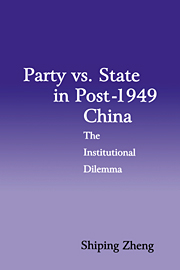Book contents
- Frontmatter
- Contents
- List of Tables
- Acknowledgments
- List of Abbreviations
- Part I Introduction
- Part II State-building under a Revolutionary Party: The Mao Zedong Era
- Part III State-building under a Reformist Party: The Deng Xiaoping Era
- 7 Reform, Legal System, and Party Rule
- 8 Changing Party–Government Relations
- 9 Military Modernization and Party Politics
- Conclusions
- Appendix A CCP Membership Changes, 1921–96
- Appendix B Campaigns in China, 1950–89
- Bibliography
- Index
7 - Reform, Legal System, and Party Rule
Published online by Cambridge University Press: 23 September 2009
- Frontmatter
- Contents
- List of Tables
- Acknowledgments
- List of Abbreviations
- Part I Introduction
- Part II State-building under a Revolutionary Party: The Mao Zedong Era
- Part III State-building under a Reformist Party: The Deng Xiaoping Era
- 7 Reform, Legal System, and Party Rule
- 8 Changing Party–Government Relations
- 9 Military Modernization and Party Politics
- Conclusions
- Appendix A CCP Membership Changes, 1921–96
- Appendix B Campaigns in China, 1950–89
- Bibliography
- Index
Summary
THE turmoil of the Cultural Revolution and the ensuing succession struggles created a large number of victims as well as a nation of cynics and dissidents. When Mao died in September 1976, his revolutionary ideology practically died with him. In February 1978, the National People's Congress convened its first meeting after Mao's death and called on the nation to achieve “four modernizations” in agriculture, industry, national defense, and science and technology. The modernization program gained momentum after Deng managed to return to the power center. The Third Plenum of the Eleventh Central Committee in late 1978 decided to abandon Mao's slogan – “Take class struggle as the key link” – and to change the priority of the Party from political campaigns to economic development.
Along with the call for economic modernization, the post-Mao Chinese leaders devoted tremendous attention to reestablishing a legal system. The Third Plenum proposed to improve the “socialist democracy” and strengthen “socialist legality.” The communiqué of the Plenum affirmed, “[I]n order to safeguard people's democracy, it is imperative to strengthen the socialist legal system so that democracy is systematized and written in such a way as to insure the stability, continuity and full authority of this democratic system and the laws: there must be laws for people to follow, these laws must be observed, their enforcement must be strict and law breakers must be dealt with.” This chapter analyzes the legal institution-building under a reformist party.
- Type
- Chapter
- Information
- Party vs. State in Post-1949 ChinaThe Institutional Dilemma, pp. 161 - 190Publisher: Cambridge University PressPrint publication year: 1997

